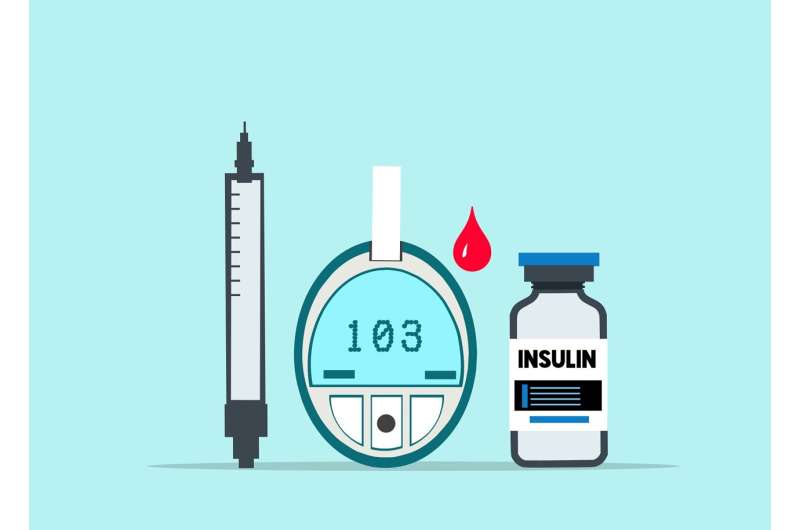This article has been reviewed according to Science X's editorial process and policies. Editors have highlighted the following attributes while ensuring the content's credibility:
fact-checked
trusted source
proofread
Insulin resistance is linked to over 30 diseases—and to early death in women, finds UK study

Insulin resistance is associated with 31 different diseases, and in women, is also linked to higher odds of early death. This is according to a study of data on hundreds of thousands of people in the UK being presented at the Annual Meeting of the European Association for the Study of Diabetes (EASD) in Madrid, Spain (9-13 September).
The conference will hear that there is compelling evidence of links between insulin resistance and conditions as diverse as Parkinson's disease, gout and sciatica.
Insulin resistance, when the body's cells don't respond properly to insulin and can't easily take up glucose from the blood, is a key feature of type 2 diabetes. The causes of insulin resistance aren't fully understood but it is thought that excess weight and lack of physical activity are the main contributing factors.
Insulin resistance is also a risk factor for cardiovascular disease. However, less is known about its wider impact on health.
To find out more, Ms. Jing Wu, of the Department of Endocrinology, Shandong Provincial Hospital, Cheeloo College of Medicine, Shandong Uni, Jinan, China, and colleagues analyzed data from the UK Biobank, which holds genetic, medical and lifestyle information provided by more than 500,000 people in the UK.
The study involved 429,159 participants (231,033 women and 198,126 men) aged between 40 and 69 years. Levels of blood sugar and fats, including cholesterol, were used to calculate each participant's TyG index—a measure of insulin resistance.
The TyG index scores ranged from 5.87 to 12.46 units, with an average reading of 8.71 units. Participants with a higher TyG score, and so a higher degree of insulin resistance at the start of the study tended to be men, older, less active, smokers, and living with obesity.
By tracking the participants' health for a median of 13 years, the researchers were able to link insulin resistance with 31 diseases.
Insulin resistance was associated with a higher risk of developing 26 of these, including sleep disorders, bacterial infections and pancreatitis, with a higher degree of insulin resistance being associated with a higher likelihood of the condition.
Specifically, every one-unit increase in insulin resistance was associated with an 18% higher risk of sleep disorders, an 8% higher risk of bacterial infections and a 31% higher risk of pancreatitis.
Insulin resistance was also linked to a lower risk of five diseases, including anemia (6% decrease in risk), Parkinson's disease (-16%) and osteoporosis (-13%). (All percentages for disease risk refer to the change in risk associated with a one-unit increase in insulin resistance.)
The relationship between insulin resistance and diabetes (+166% or 2.66 times higher risk), gout and dyslipidemia (unhealthy levels of blood fats, +61%) and related disorders was particularly strong.
Some of the associations, such as those between insulin resistance and a higher risk of developing obesity (7% higher risk), hypertension (+21%) and ischemic heart disease (+24%), had been documented before.
Other associations, such as those between insulin resistance and gout, Parkinson's disease and sciatica, were new to science.
"We found that every one-unit increase in insulin resistance increased the risk of gout by 65% but decreased the risk of Parkinson's disease by 16%," says Ms. Wu. "Additionally, every one-unit increase in insulin resistance was linked to a 10% higher likelihood of sciatica."
The researchers then looked at the association between insulin resistance and all-cause mortality—death from any cause. In this analysis, they considered males and females separately. This showed insulin resistance to be associated with all-cause mortality in females. No link was found for males.
In females, every one-unit increase in insulin resistance was associated with an 11% higher risk of dying during the study period.
Analysis of data in existing studies that included data on insulin resistance and health confirmed the findings.
Ms. Wu says, "We have shown that by assessing the degree of insulin resistance, it is possible to identify individuals who are at risk of developing obesity, hypertension, heart disease, gout, sciatica and some other diseases. This provides a basis for early intervention measures to reduce the risk of disease and also offers new ideas for disease prevention and treatment. Raising public awareness of these modifiable factors is important, as it empowers individuals to take proactive steps towards better metabolic health.
"While we didn't look at ways of improving insulin resistance, previous research has shown that lifestyle modifications, such as regular exercise and following a balanced diet low in added sugars and refined carbohydrates, can help reduce the risk of insulin resistance."




















